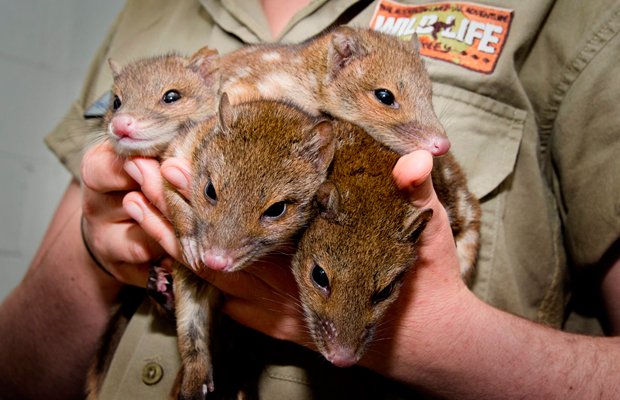Baby quolls a boost for breeding program

FIVE NEWBORN SPOTTED-TAILED quolls are making themselves at home at WILD LIFE Sydney in Darling Harbour.
The new additions are a success story for the park, which has only just begun its spotted-tailed quoll breeding program.
Australia is home to four species of quoll: the northern, spotted-tailed, eastern, and western. At one time, at least one of the four species could be found throughout most of Australia, but since European settlement, habitat loss, deforestation and introduced predators have all put increasing pressure on these small, carnivorous marsupials which are the closest relatives to the Tasmanian devil.
The spotted-tailed quoll (also known as the tiger quoll, Dasyurus maculatus) is the largest of all the quoll species, with a territory stretches all the way from south-east Queensland to parts of South Australia and Tasmania. They typically cover vast distances to find mates, which presents a bit of a challenge to captive breeding programs.


These baby spotted-tailed quolls were born recently at the WILD LIFE park in Sydney.
Quoll breeding a challenge
“You have to be quite selective with your individual male and female [quoll],” says Mike Drinkwater, a curator at WILD LIFE Sydney. “If you get it wrong, the male has all the potential in the world to kill the female.”
To help ensure success, Mike says WILD LIFE Sydney selected two young, inexperienced parents – just one year old – to participate in the breeding program. Quolls, which only have a life span of up to five years in the wild, do not typically breed until they reach two years of age.
Four of WILD LIFE Sydney’s youngsters will be sent to zoos or wildlife parks across Australia, but one – Nelson – may be making an appearance in one of the park’s interactive exhibits in the future.
“Our ultimate aim is to seek to condition a spotted-tailed quoll to… basically to become an ambassador for all quolls,” says Mike.
VIDEO: spotted-tailed quoll at the Cape Otway Centre for Conservation Ecology
RELATED STORIES

